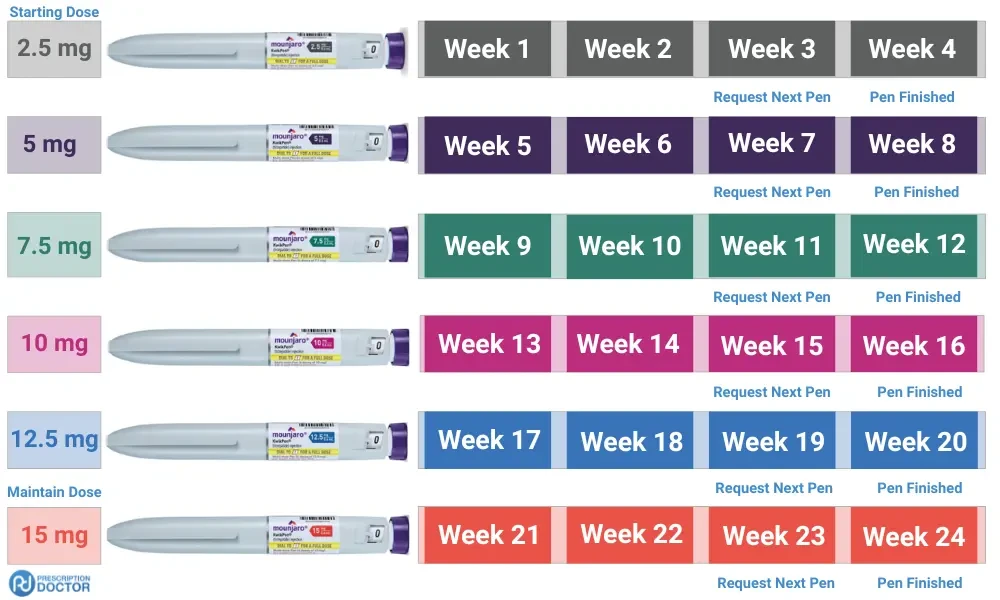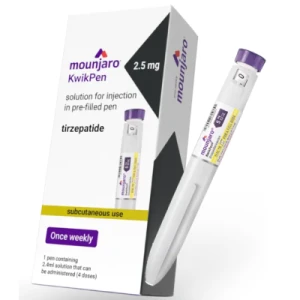10 Reasons You’re Not Losing Weight on Mounjaro
Table of contents:
Mounjaro is an effective weight loss medication that has shown some impressive before-and-after results. However, weight loss isn’t a straightforward journey, even with the right treatments. As a result, you may experience peaks and troughs along the way, or even periods of plateauing.
If you’re not losing weight on Mounjaro, the important thing is to be patient. It can take a while to notice weight loss, and you may need to give yourself a bit more time to achieve the results you want. There are also several factors that could be at play, such as lifestyle, diet, dosage, and medication issues.
So, if you’re wondering, “Why am I not losing weight on Mounjaro?”, read on as we explore 10 potential reasons and explain what you can do to help kickstart your progress again.
START YOUR MOUNJARO CONSULTATION TODAY
How Much Weight Can You Lose on Mounjaro?
Clinical studies have demonstrated that it is possible to lose up to 22.5% of your starting body weight on the highest dose. Meanwhile, the average weight loss after 4 weeks on Mounjaro is around 4% and 6% after 8 weeks.
However, everyone’s journey is different, and the amount you can lose will depend on how your body responds to tirzepatide, Mounjaro’s active ingredient, as well as the lifestyle changes you make. You can find out more about how much you could lose on Mounjaro in our ‘Mounjaro Week by Week’ guide.
How Fast Can You Lose Weight on Mounjaro?
Mounjaro starts to work soon after your first injection, and many people notice positive changes in their appetite within the first week of starting treatment. This equates to an average 1% weekly weight loss within the first month of Mounjaro injections.
At the highest dose, Mounjaro can help you lose approximately 9% of your starting body weight within 3 months. The average weight loss at the 5mg, 10mg, or 15mg doses over 4, 8, and 12 weeks is shown in the table below:
| Mounjaro 5 mg | Mounjaro 10 mg | Mounjaro 15 mg | |
|---|---|---|---|
| 4 weeks | ≤ 4% | ≤ 4% | ≤ 4% |
| 8 weeks | ≤ 6% | ≤ 6% | ≤ 6% |
| 12 weeks | 8% | ≤ 9% | ≤ 9% |
Why Am I Not Losing Weight on Mounjaro?
If your weight loss with Mounjaro has stalled, several factors may be contributing to it. Weight loss plateaus are common, even without medication; however, there are steps you can take to help reenergise your journey.
In this section, we explore the common reasons for not losing weight on Mounjaro and the actions you can take to get back on track.
1 - You’re Not Using the Medication Properly
When taking Mounjaro, consistency is key for the best results. That means choosing the best day and time to take Mounjaro for you, as this will be the same for the duration of your treatment. Keeping to a schedule ensures that you have a steady level of tirzepatide in your system, giving you the best possible chance of success.
The best way to support your weight loss on Mounjaro is to take it exactly as prescribed. Therefore, if you’re not administering the medication properly, you may experience some difficulty. Our ‘how to inject Mounjaro safely’ guide provides all the essential information you need to ensure you use your weight loss injection effectively.
2 - You’ve Not Fully Committed to Lifestyle Changes
Lifestyle changes, including a healthy diet and regular exercise, are crucial for achieving weight loss with Mounjaro. If you have not fully committed to lifestyle changes, then this can hinder your progress.

Focus on cutting your calorie intake and on getting good nutrition from the food you eat. Use our 7-day diet plan to help you choose balanced, nutrient-dense foods to give you the best opportunity to lose weight.
Equally, combining Mounjaro and exercise can help keep your calorie intake in check, aid in burning fat, and boost your metabolism. Aim to complete 30 minutes of exercise each day or 150 minutes each week, including activities like walking to work or the shops, household chores, and gardening.
3 - You’re Not on the Right Dosage
Lower Mounjaro doses may not effectively suppress your appetite enough for you to notice the stages of weight loss. However, this is normal. Everyone will start on the lowest dose, and gradually titrate up until you reach the best maintenance dose for you. This gradual dosage schedule helps your body get used to the medication, keeping you safe and lowering the chance of side effects.

As your dose increases, you will notice more significant Mounjaro effects. The SURMOUNT-1 trial found that patients lost:
- 16% on the 5 mg dose
- 21.4% on 10 mg dose
- 22.5% on 15 mg dose
Patience is key when you are losing weight, so if you haven’t reached a maintenance strength yet, it’s likely you’ll need to build up your dose before you start to see significant results.
4 - You May Have an Underlying Medical Condition
Some medical conditions can impact your ability to shift the pounds, making it more difficult to lose weight or even contributing to weight gain, even when taking Mounjaro. That’s why it is important to inform your prescriber about any pre-existing medical conditions you have or any medications you are currently taking.
Some common examples of chronic conditions that may hinder weight loss are:
- Polycystic ovary syndrome (PCOS): hormonal imbalances can make it harder to lose weight
- Type 2 diabetes: insulin resistance can mean it takes a little longer for you to notice results
- Hypothyroidism (underactive thyroid): low levels of thyroid hormones can slow your metabolism and reduce your energy levels
Before you start Mounjaro treatment, tell your clinician about any relevant medical history because you may need extra support on your weight loss journey.
5 - Side Effects May Be Hampering Progress
Mounjaro side effects are relatively common, particularly when you first start treatment or you increase your dose and can slow your progress as you try to manage them. This could lead to you skipping or missing doses, making Mounjaro less effective.
Some of the very common Mounjaro side effects include:
- Feeling sick
- Being sick
- Diarrhoea
- Constipation
- Stomach pain
Most Mounjaro side effects only last for a short while as your body adjusts to the medication. If you are experiencing side effects that are difficult to manage or you believe they are affecting your progress, please contact your clinician for additional guidance. It may be that you need to lower your dosage or even try alternative treatments.
6 - Poor Sleep and Stress Management
Lifestyle factors, such as poor sleep or chronic stress, can impact weight loss because they can cause hormonal imbalances, which make it harder to lose weight. For example, high stress increases cortisol, which can lead to belly fat accumulation and weight gain.
Mounjaro
- Approved Weight Loss Treatment
- Suitable for adults with a BMI of +30kg/m²
- Pre-filled injection pen
Poor sleep also interferes with your hormones, raising the levels of the hunger hormone ghrelin and lowering leptin, which helps you feel full. This increases the chances of overeating and snacking, and contributes to putting on weight.
7 - You Need to Give it More Time
It can take several weeks for noticeable weight loss to happen on Mounjaro. So, if you have just started the medication and have yet to see the results you were expecting, be patient and stick to your treatment plan. Stay focused on the small successes, such as baggy clothes, reduced appetite, and feeling less tempted to snack.

Some clinical trials have shown that some individuals began to lose weight after four weeks, with an average weight loss of 8% after 12 weeks at the highest dose. So, stick to the plan; it won’t be long before you start noticing the difference.
8 - You’ve Hit a Mounjaro Plateau
Weight loss plateaus are common and occur when your body gets used to a routine, like a new diet or exercise plan. This can cause your progress to slow or even temporarily stop. Although a plateau can be frustrating, there are steps you can take to help kick-start your weight loss again.
Things like increasing your protein intake, exercising more, and managing stress can all help to break the plateau. However, a plateau may also be a sign that your Mounjaro dose is too low. Contact your clinician if you have been experiencing a plateau for a while despite making changes to your lifestyle.
9 - Other Medications Might Be Affecting You
Certain prescription medications can make it more difficult to lose weight. That’s because they can impact your appetite, metabolism, fluid retention, or even alter how your body stores fat.
Some of the common medications that can restrict your weight loss progress are:
- Antidepressants: Examples such as serotonin reuptake inhibitors (SSRIs) and amitriptyline can cause weight gain.
- Corticosteroids: These can promote fat storage and increase water retention.
- Beta-blockers: Used to treat high blood pressure and heart issues, these medications can slow your metabolism and lower your energy levels, making exercise more difficult.
- Insulin: Anti-diabetes medications can sometimes promote fat storage, making weight loss challenging.
- Antipsychotics: Some of these drugs can increase your appetite and change your sensitivity to insulin.
If you are taking any of these medications, it is important that you do not just stop them. Instead, speak to your clinician about a medication review to find out if any are affecting your weight loss or interfering with the effectiveness of Mounjaro.
10 - Mounjaro Isn’t For You
Although Mounjaro is considered to be the most effective weight loss injection, it isn’t always right for everyone. If you have not lost at least 5% of your starting body weight within 3 to 6 months of starting treatment, it’s likely that a clinician will advise you to stop taking Mounjaro and switch to an alternative like Wegovy or Nevolat.
There are several other weight loss medications available if Mounjaro is not suitable for you. At Prescription Doctor, we offer the following weight loss drugs:
- Wegovy: Another example of a weekly weight loss injection that works by binding to the GLP-1 receptors to suppress your appetite. It contains the active ingredient, semaglutide, and has been shown to help people lose up to 15% of their initial body weight within 68 weeks on the highest strength.
- Nevolat: A generic liraglutide injection, formerly known as Saxenda, that is taken daily and can help you lose 8% of your body weight after 56 weeks.
- Xenical and Orlistat: These treatments contain 120 mg of the active ingredient orlistat that works by blocking around a third of the fat you eat from being absorbed. Research shows that up to 60% of people who take Orlistat or Xenical lose at least 5% of their body weight after 12 weeks. Orlistat is also available over the counter under the brand name Alli, which contains a smaller 60 mg dose.
- Mysimba: A prescription-only weight loss pill that reduces cravings and emotional eating by targeting the brain’s hunger and reward centres. It contains the active ingredients bupropion and naltrexone and is usually taken twice a day to suppress your appetite. It can help you lose 8.1% of your initial body weight after 56 weeks.
Our dedicated weight loss service provides all the information you need to make the right choice for you.
How to Lose More Weight on Mounjaro
If you're currently not losing weight on Mounjaro, or are keen to maximise your results, there are several proven strategies you can try that go beyond just taking the medication. From timing your meals to enhancing your exercise routine and managing side effects, even small, subtle changes can make a big difference.
Check out our expert guide, ‘10 Essential Mounjaro Tips and Tricks for Weight Loss,’ where you’ll find practical lifestyle tips and answers to common questions to help you break through plateaus and accelerate your success.
Mounjaro
- Approved Weight Loss Treatment
- Suitable for adults with a BMI of +30kg/m²
- Pre-filled injection pen
Not Losing Weight on Mounjaro? Frequently Asked Questions Explained
If you’re not losing weight on Mounjaro, there are several potential reasons why, including not being on the correct dose. Here, we address some of the most frequently asked questions regarding the lack of progress with this popular weight loss injection.
Why am I Not Losing Weight on Mounjaro 5mg?
You may not be losing weight on Mounjaro 5mg because it’s still a mid-range dose, so some people don’t notice significant weight loss at this stage. It can take time for your body to adjust, so steady progress may not be immediately obvious.
Discuss with your clinician the possibility of adjusting your dose and reviewing lifestyle or health factors that may be impacting your results.
Why am I Not Losing Weight on Mounjaro 10mg?
At a 10mg Mounjaro dose, you might expect more weight loss, but results can still vary. Now is probably a good time to monitor your calorie intake; if it is too high or you’re not getting enough exercise to burn off the excess, then your weight loss progress will stall.
Try making healthy food swaps or taking the stairs instead of the lift, or walking to work. All of these can help you on your journey. Remember, Mounjaro doesn’t work on its own; it needs some effort from you to support its benefits. Speak to your clinician about whether making further lifestyle changes could help and how they can support you.
Why am I Not Losing Weight on Mounjaro 15 mg?
If you’re not losing weight on the maximum 15mg dose of Mounjaro, there is a possibility that the medication is not working for you. Not everyone responds to the active ingredient, tirzepatide, in the same way and may be more suited to an alternative weight loss injection or pill.
So, if you’ve made all the necessary changes and ruled out underlying health conditions and medications impacting your ability to lose weight, it could be time to consider an alternative weight loss medication.
What Happens When I Stop Taking Mounjaro?
When you stop taking Mounjaro, it is common to regain some of the weight you have lost, with some research showing that some people can regain 14% of their body weight when they stop taking tirzepatide. That’s because when you stop GLP-1 medications, their beneficial effects stop, too, so you may notice that your appetite returns.
Can You Gain Weight on Mounjaro?
Yes, it is possible to gain weight on Mounjaro if you do not stick to a healthy diet or eat too much. Being in a calorie deficit, where you eat fewer calories than you burn, is important while losing weight and requires regular exercise. If you are doing these things and are gaining weight, speak to your clinician for advice.
How to Break a Weight Loss Plateau on Mounjaro
If you have hit a weight loss plateau on Mounjaro, there are several things you can do, such as:
- Review your calorie intake
- Increase your physical activity
- Focus on nutrient-dense, high-protein foods
- Staying hydrated
- Managing stress
- Getting enough sleep
A weight loss plateau is quite common, and you should continue taking your treatment while assessing your lifestyle. You may also need to increase your dose to help start your weight loss journey again.
Comprehensive Weight Loss Support from Prescription Doctor
If you’re asking yourself, ‘Why am I not losing weight on Mounjaro?’, Prescription Doctor can help. Our personal and dedicated weight loss service can provide you with expert advice, a library of self-help resources, including meal plans, how to inject Mounjaro, and how to manage side effects, and access to genuine medication.
Weight loss can be challenging, but we’re here to provide the right support to help you achieve your targets. From convenient online consultations to discreet delivery, you can rest assured that you’re in safe and capable hands.
Our specialist clinicians will be with you every step of the way, from recommending the right treatment to regularly checking in with you to monitor progress. A holistic weight loss consultation service you can rely upon.
Think Prescription Doctor can help you? Start your Mounjaro consultation now.
Sources
- Department of Health and Social Care (2023): Accessing Wegovy for weight loss: Everything you need to know.
- EMC (2025): Mounjaro KwikPen 2.5mg solution for injection in pre-filled pen.
- EMC (2025): Nevolat 6 mg/ml solution for injection in pre-filled pen.
- EMC (2024): Wegovy 2.4 mg, FlexTouch solution for injection in pre-filled pen.
- EMC (2023): Mysimba 8 mg/90 mg prolonged-release tablets.
- EMC (2023): Xenical 120 mg hard capsules.
- International Journal of Endocrinology (2015): The Impact of Sleep and Circadian Disturbance on Hormones and Metabolism.
- JAMA (2024): Continued Treatment With Tirzepatide for Maintenance of Weight Reduction in Adults With Obesity: The SURMOUNT-4 Randomized Clinical Trial.
- NEJM (2022): Tirzepatide Once Weekly for the Treatment of Obesity.
- The Obesity Society (2022): Effects of acute sleep loss on leptin, ghrelin, and adiponectin in adults with healthy weight and obesity: A laboratory study.
Authored By

Leanne Edermaniger
Medical Content WriterPublished on: 11/09/2025
Reviewed By

Mohamed Imran Lakhi
MPharm - Lead PharmacistReviewed on: 11/09/2025
© 2013 - 2026 Al Muhsineen Limited. All Rights Reserved. Registered Pharmacy: 34 Halliwell Road, Bolton BL1 8RL. Registered Office: 254 First Floor, Shearbrow, Blackburn, England, BB1 8DS







